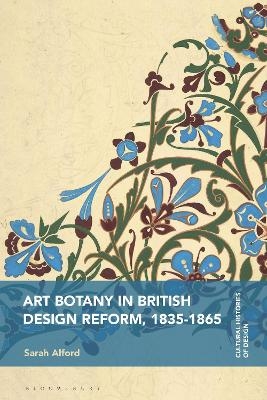
Art Botany in British Design Reform, 1835-1865
Seiten
2024
Bloomsbury Visual Arts (Verlag)
978-1-350-35052-6 (ISBN)
Bloomsbury Visual Arts (Verlag)
978-1-350-35052-6 (ISBN)
Drawing on the fields of design history and the history of science, this book examines the important role that botanical science played in the emergence of Victorian design theory.
In early 19th-century Britain, a rapid influx of plants from other countries began to confuse the orders of classification. As these new specimens arrived in nurseries and conservatories, botanists revised and promoted a new taxonomy: the Natural System. In parallel, in 1835, British manufacturers faced a government inquiry in order to improve the output of the British design industry. They needed a nationally identifiable design aesthetic and the inquiry led to the creation of the Government Schools of Design and the Design Reform movement. This book explores how, whilst botanists used drawings to clarify new systems of plant classification, designers learnt ‘art botany’, the practice of basing decorative form and ornament on the hidden, natural laws that govern plant growth and structure. Design reformers used botany as a model for how to create and identify what is new and incorporate it into what was already familiar and meaningful, all within the purview of developing a professional field of practice.
Sarah Alford provides a rich, interdisciplinary study of how the fields of design and botanical science came together. Through a framework of material culture, Alford sheds new light on the work of leading botanists, designers and illustrators such as Sarah Drake, John Lindley, Richard Redgrave, Owen Jones and Christopher Dresser. This book reveals how the designation of what design reformers deemed appropriate for the surface decoration of material structures as varied as carpets, jugs, wallpaper, and furniture, was an embrace of botanical science as a source of fantasy and imagination.
In early 19th-century Britain, a rapid influx of plants from other countries began to confuse the orders of classification. As these new specimens arrived in nurseries and conservatories, botanists revised and promoted a new taxonomy: the Natural System. In parallel, in 1835, British manufacturers faced a government inquiry in order to improve the output of the British design industry. They needed a nationally identifiable design aesthetic and the inquiry led to the creation of the Government Schools of Design and the Design Reform movement. This book explores how, whilst botanists used drawings to clarify new systems of plant classification, designers learnt ‘art botany’, the practice of basing decorative form and ornament on the hidden, natural laws that govern plant growth and structure. Design reformers used botany as a model for how to create and identify what is new and incorporate it into what was already familiar and meaningful, all within the purview of developing a professional field of practice.
Sarah Alford provides a rich, interdisciplinary study of how the fields of design and botanical science came together. Through a framework of material culture, Alford sheds new light on the work of leading botanists, designers and illustrators such as Sarah Drake, John Lindley, Richard Redgrave, Owen Jones and Christopher Dresser. This book reveals how the designation of what design reformers deemed appropriate for the surface decoration of material structures as varied as carpets, jugs, wallpaper, and furniture, was an embrace of botanical science as a source of fantasy and imagination.
Sarah Alford is Assistant Professor of Craft History and Theory at Alberta University of the Arts, Canada, specializing in 19th-century craft and design history. She has presented at the College Art Association conference and the Canadian Craft Biennial, and has had writing published in the Journal of Design History.
Acknowledgments
List of Figures
Introduction
1. Multiple Affinities
2. Well-Spring
3. The Well-Spring and the Orchid
4. Natural Philosophy and the Crow's Foot Claret Jug
5. Plans and Elevations of Flowers
Conclusion
Bibliography
Index
| Erscheinungsdatum | 30.11.2024 |
|---|---|
| Reihe/Serie | Cultural Histories of Design |
| Zusatzinfo | 61 bw illus |
| Verlagsort | London |
| Sprache | englisch |
| Maße | 156 x 234 mm |
| Themenwelt | Kunst / Musik / Theater ► Design / Innenarchitektur / Mode |
| Kunst / Musik / Theater ► Kunstgeschichte / Kunststile | |
| Naturwissenschaften ► Biologie ► Botanik | |
| Sozialwissenschaften | |
| ISBN-10 | 1-350-35052-4 / 1350350524 |
| ISBN-13 | 978-1-350-35052-6 / 9781350350526 |
| Zustand | Neuware |
| Informationen gemäß Produktsicherheitsverordnung (GPSR) | |
| Haben Sie eine Frage zum Produkt? |
Mehr entdecken
aus dem Bereich
aus dem Bereich
Diversität, Morphologie, Ökologie und Evolution der Pilze
Buch | Softcover (2023)
Springer (Verlag)
49,99 €
Gefäßpflanzen: Grundband
Buch | Hardcover (2021)
Springer Spektrum (Verlag)
44,99 €


